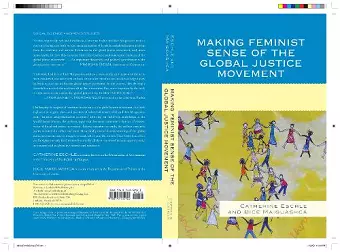Making Feminist Sense of the Global Justice Movement
Catherine Eschle author Bice Maiguashca author
Format:Paperback
Publisher:Rowman & Littlefield
Published:16th Mar '11
Currently unavailable, and unfortunately no date known when it will be back
This paperback is available in another edition too:
- Hardback£112.00(9780742555921)

In recent years, the global justice movement has grabbed headlines and reshaped political imaginations worldwide. Surprisingly, however, feminism is largely absent from accounts of the movement—despite the fact that feminists are extensively involved on the ground. Addressing this significant gap in the literature, Eschle and Maiguashca shine a powerful light on what they term "feminist antiglobalization activism." Drawing on their fieldwork at the World Social Forum and European Social Forum, 2003–2005, they begin by outlining the vital role of feminist antiglobalization activism in Forum processes and events while also emphasizing its diversity. The authors then trace the origins of this activism, the critiques and aspirations of those involved, their political practices beyond the Forum, and their efforts to forge a sense of solidarity among themselves and with others. Taking feminism seriously, Eschle and Maiguashca conclude, points us toward a richer and more theoretically nuanced understanding of the global justice movement and its struggle to create other possible worlds. Their book thus offers vital insights not only for feminists, but also for all those interested in contemporary social movements and in global governance and resistance.
Catherine Eschle and Bice Maiguashca address a very timely and important theme in their wonderful, accessibly written book on the often invisible and unacknowledged work by feminist activists within the global justice movement. In the process, they develop a feminist framework for understanding that movement. But, more importantly, the book is a testimony to the notion that global justice is for EVERY INDIVIDUAL! -- Marianne H. Marchand, Universidad de las Américas, Puebla
In this empirically rich and lucid book, Catherine Eschle and Bice Maiguashca make a very convincing case both for the marginalization of feminist antiglobalization activism from the academic and activist literatures on the global justice movement, and, more importantly, for how this exclusion limits the empirical and conceptual contours of the global justice movement. . . . An important theoretical and political contribution to the global justice movement. -- Manisha Desai, University of Connecticut
Eschle and Maiguashca explore an original subject using innovative theoretical tools and rich empirical information (including extensive interviews). At a time of transition in global politics and the social movements that react to and interact with the power structure of the international arena, the authors remind students and scholars alike to reflect on the power relations within progressive movements as well. The authors explore the activities of feminist anti-globalization activists, the tools that scholars and students need to analyze those activities, and the implications of feminist anti-globalization activism for thinking about the global justice movement as a whole. This work is crucially important and well done in a way accessible to scholars, students, and practitioners. . . . Essential. * CHOICE *
Eschle and Maiguashca succeed in their attempts to challenge commentary on the role of identity within the global justice movement literature. . . . The authors deepen our understanding of the global justice movement and the [World Social Forum] process while developing a vital critique of the literature on the global justice movement. This book will be of interest not only in its refinement of our understanding of the global justice movement but also in providing a case of uncovering the neglect of feminism activism within studies of social movements. This book builds on and contributes to the literature on the exclusion of women within social movement organizing and therefore is of interest to scholars of feminist activism. It also could serve as a primer for social movement students interested in the global justice movement. . . . A must read for antiglobalization activists of all types for its insightful critiques of both the global justice movement and the social forum process. * Mobilization *
This is a great book that fills an important gap in the literature. -- Erin Kenny, Drury University
ISBN: 9780742555938
Dimensions: 230mm x 156mm x 21mm
Weight: 424g
280 pages